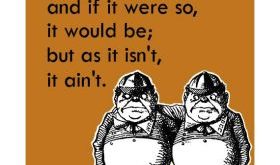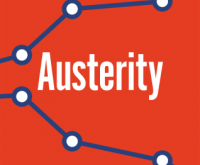Tweedledum and Tweedledee Economics Krugman’s entire essay is about two groups, both deeply entrenched at (what they believe to be) the top of academic economics. Both are deeply preoccupied with their status and with a struggle for influence and for academic power and prestige — against the other group. Krugman calls them “Saltwater” and “Freshwater” economists; they tend to call themselves “New Classicals” and the “New Keynesians” … The two groups share a...
Read More »How to think about statistics
How to think about statistics [embedded content] If anything, Gelman’s talk underlines how important it is not to equate science with statistical calculation. All science entail human judgement, and using statistical models doesn’t relieve us of that necessity. Working with misspecified models, the scientific value of statistics is actually zero — even though you’re making valid statistical inferences! Statistical models are no substitutes for doing real...
Read More »Das Rezo-Video
[embedded content] YouTuberinnen und YouTuber sprechen auf ihren Kanälen über Politik. Und erreichen ein Millionenpublikum. Rezos Video ging viral. Mehr als dreizehn Millionen Menschen haben es geklickt.
Read More »Die Nazikeule
[embedded content] [h/t Jan Milch]
Read More »Nancy Cartwright on causal inference
Nancy Cartwright on causal inference [embedded content]
Read More »Poupée de cire, poupée de son
Poupée de cire, poupée de son [embedded content] France Gall 1947-2018. R.I.P.
Read More »Uskali Mäki on the ’empirical turn’ in economics
Uskali Mäki on the ’empirical turn’ in economics [embedded content]
Read More »Alesina’s ‘expansionary austerity’ — a tale of scientific delusion
Alesina’s ‘expansionary austerity’ — a tale of scientific delusion Alberto Alesina has returned to the debate on budget deficits, austerity, and growth … Now, with fellow economists Carlo Favero and Francesco Giavazzi, Alesina has written a new book entitled Austerity: When It Works and When It Doesn’t … New book, old tune. The authors’ conclusion, in a nutshell, is that “in certain cases the direct output cost of spending cuts is more than compensated for...
Read More »Please tell me what we’ve learned
Please tell me what we’ve learned [embedded content] [h/t Nanikore]
Read More »Julia Kristeva — renowned literary theorist and spy
Julia Kristeva — renowned literary theorist and spy Throughout the recent, highly public exchange of claims and counterclaims, accusations and counteraccusations, Kristeva has expressed concern that her reputation as an engaged intellectual would be unfairly and permanently harmed. In truth, however, the damage had been done long ago, the cumulative effect of her uncritical support, as a member of the Tel Quel circle, for left-wing dictatorships during the...
Read More » Lars P. Syll
Lars P. Syll




